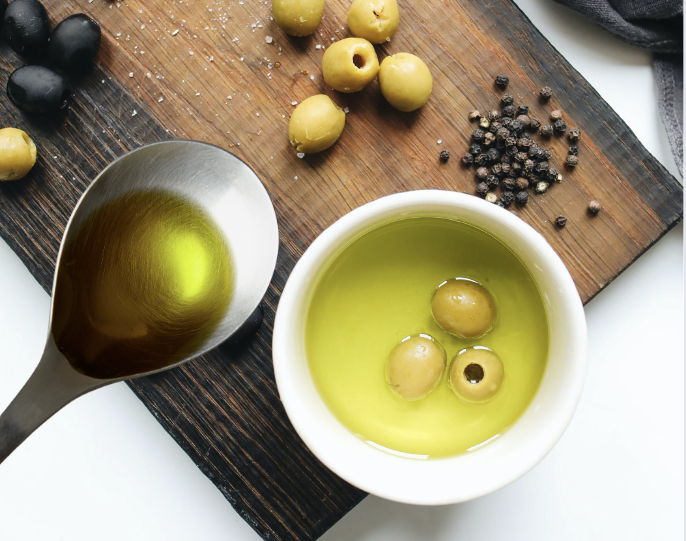What to Eat and Drink
Benefits Of A Teaspoon Of Olive Oil A Day
Are you seeking for a simple yet effective strategy to improve your health? Look no further than the kitchen pantry. Incorporating only a teaspoon of olive oil into a day your daily routine might provide several health benefits. From encouraging heart health to improving brain function, the benefits of this tiny supplement are numerous.
Nutritional Composition of Olive Oil
Olive oil is noted for its high nutritional content. It is mostly made up of monounsaturated fats, which are considered good fats. These fats are necessary for the body because they help lower bad cholesterol and raise good cholesterol levels. In addition to lipids, olive oil includes antioxidants like vitamin E and polyphenols, which help the body fight oxidative stress and inflammation.

Health Benefits of Consuming Olive Oil
Olive Oil and Heart Health
One of the most well-known advantages of olive oil is its beneficial effect on cardiovascular health. Olive oil contains monounsaturated fats, which can help reduce the risk of heart disease by lowering bad cholesterol and raising good cholesterol. Additionally, olive oil has anti-inflammatory effects that can help prevent plaque buildup in the arteries, lowering the risk of heart attacks and strokes.
Research studies have consistently demonstrated that those who eat olive oil on a regular basis have a lower risk of heart disease than those who do not. The Mediterranean diet, which is high in olive oil, has been linked to better heart health and a lower risk of cardiovascular disease.
Olive Oil and Brain Health
In addition to its cardiovascular benefits, olive oil promotes cognitive health. The brain is mostly made up of fat, and consuming good fats such as olive oil helps improve cognitive performance. Studies have indicated that consuming olive oil can improve memory, concentration, and overall cognitive ability.
Furthermore, the antioxidants in olive oil protect the brain from oxidative stress and inflammation, both of which contribute to age-related cognitive decline and neurodegenerative illnesses such as Alzheimer’s. Consuming olive oil can help preserve brain function and lower the risk of cognitive impairment as you age.

Olive Oil and Weight Management
Consuming olive oil, contrary to popular opinion, can help with weight management. The monounsaturated fats in olive oil make you feel full and satisfied, which reduces the likelihood of overeating. Furthermore, these good fats can increase metabolism and aid in the breakdown of stored fat.
According to research, those who incorporate olive oil into their diet had a lower body mass index (BMI) and a healthier weight than those who consume other types of fat. While olive oil is high in calories, it is a nutrient-dense food that may be included in a healthy diet without adding weight.
Olive Oil and Skin Health
Olive oil is not only good for your inside health, but it also provides a number of skin benefits. Olive oil’s antioxidants protect the skin from free radical damage, which can lead to premature aging and wrinkles.
Olive oil is also a natural moisturizer that hydrates the skin and helps to preserve its suppleness. It can be applied topically as a moisturizer or mixed into bathwater to relieve dry, irritated skin. Olive oil can also be used as a natural makeup remover, removing makeup softly and effectively without depleting the skin’s natural oils.
Incorporating Olive Oil into Your Daily Routine
Now that you are aware of the myriad benefits of olive oil, it’s time to incorporate it into your daily routine. Here are some simple ways to add a teaspoon of olive oil to your diet:
- Salad Dressings: To make homemade salad dressings, start with olive oil. Mix it with vinegar or lemon juice, herbs, and spices to make a tasty and nutritious dressing.
- Cooking: Replace butter or other oils with olive oil when sautéing vegetables, grilling meats, or roasting potatoes. Olive oil enhances the flavor of meals while giving health advantages.
- Dipping: Use a teaspoon of olive oil as a dipping sauce on bread. For more taste, add some herbs or garlic.
- Smoothies: To increase the nutritional value of your favorite smoothie, add a teaspoon of olive oil. It pairs wonderfully with fruits and vegetables, adding a creamy texture.

Choosing the Right Type of Olive Oil
When selecting olive oil, it’s important to choose the right type to maximize its health benefits. Here are some tips to keep in mind:
- Extra Virgin Olive Oil: This is the highest quality and least processed form of olive oil. It is extracted from the first cold pressing of the olives and retains the most nutrients and flavor.
- Virgin Olive Oil: This is also a high-quality oil but has slightly lower acidity compared to extra virgin olive oil. It is suitable for cooking and dressing.
- Light or Pure Olive Oil: These oils are more refined and have a milder flavor. They are suitable for high-heat cooking but may not have the same health benefits as extra virgin olive oil.
Conclusion
Incorporating a teaspoon of olive oil into my daily diet has become a simple and delightful ritual that I’ve embraced for the sake of my health. I’ve discovered that it goes beyond just adding flavor to my meals – it’s a powerhouse of benefits that enhance my overall well-being. Olive oil, with its rich source of monounsaturated fats, antioxidants, and anti-inflammatory properties, has become a valuable addition to my daily nutritional intake.
Taking this small step towards a healthier lifestyle has been a positive change for me. I’m enjoying the benefits of improved heart health, enhanced brain function, and more. It’s a simple yet impactful choice that I encourage others to consider for their well-being. Why not start reaping the benefits of olive oil today? It’s a flavorful journey towards a healthier me!
Trusted Health, Wellness, and Medical advice for your well-being


